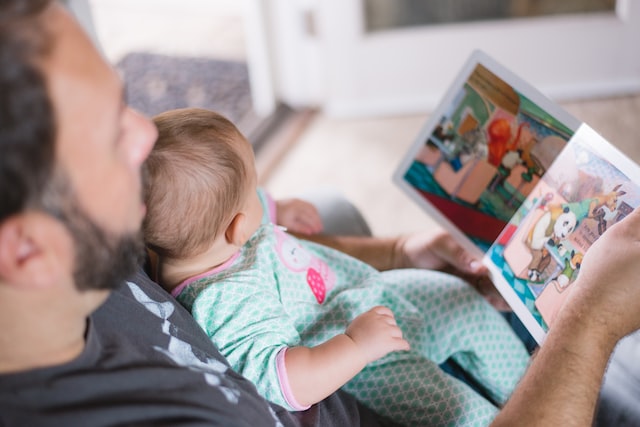Learn to boost your child’s social and emotional development through reading. Equip your child with essential skills for a brighter future.
HOW TO TEACH SOCIAL-EMOTIONAL LEARNING THROUGH READING
You might initially think reading books is good for language development—and you’d be right! Reading books can help a child learn vocabulary they don’t frequently encounter, and it can help them learn syntax and grammar.
But reading books with your children means so much more than that.
It’s also important to promote positive behaviours and cognitive and social development—especially when incorporating Social Emotional Learning (SEL) principles into reading activities.
In this article, I’ll explore how parents can teach social-emotional skills through reading and how you, as a parent, can help support language, cognitive, social, and emotional intelligence using books as early as infancy.
Benefits Of Teaching Social-Emotional Learning Through Reading
The body of research supporting social-emotional learning continues to grow. Combining the power of storytelling with social-emotional skills concepts helps parents:
- Foster positive relationships and social behaviours.
- Teach children about how others handle situations.
- Boost peer relationship skills.
- Expose children to various emotions.
- Teach social norms.
Children 0 to 18 Months Old
Picture books are a great way to introduce babies and toddlers to the world. Start by using picture books to point at objects and name them. You can also point out colors and shapes. Eventually, you can move on to pointing out actions (e.g., the boy is running/eating/ crying).
At this age, your child may be unable to sit through a whole story (that’s okay). So each time you pick up a book, focus on a different aspect of the story. Repetition is good, so a few books are sufficient.
When reading whole stories, choose books that are short and rhyme. Rhyming is very important for early language development.
Children 18 Months To 3 Years Old
As your child’s language, cognitive, and motor skills develop, start asking your child to point to objects on the page (e.g., Where is the duck? Show me the duck!).
Start with obvious elements of the book and work towards elements that might be less noticeable or harder to find. This will teach your child to scan a page for information.
Also, point out how that same thing might look different on another page because it’s drawn from a different angle (e.g., here is the girl eating, here is the same girl taking a bath).
Children 3 To 6 Years Old
When your child starts speaking in sentences, ask them questions about the story before turning to the next page (e.g., what happens next?).
You will notice that even with books you may have read together many times, they might not have yet been able to retain the storyline or understand action-reaction.
Then you can start asking questions that work on perspective taking: how is the boy feeling (point to sad face), why does the boy look sad?
Children In Elementary School
At first, shared reading (where the child reads one page, and the parent reads the other page) can help a new reader to continue enjoying books. Pre-reading activities can also support reading comprehension.
Reviewing pictures and subheadings along with new vocabulary and concepts before beginning to read can help your child link new information with material that was learned previously.
Asking questions about the material is also important; factual questions and questions requiring your child to make inferences and predictions are best.
Children In High School
At this point, shared reading is no longer an option, but you can continue supporting reading by having books available in the home. Books are expensive, and not everyone has the space to store large quantities of books.
I suggest leveraging your public library as a resource. Every few weeks, visit your library and encourage your teen to pick a book.
Maybe your teen prefers comic books, and those are fine too. The joy of reading is something built over time.
Don’t Forget Parent Modeling!
If you switch on the TV (or get on your phone) as soon as supper is done and don’t turn it off until you go to bed, it’s hard to expect your child not to do the same.
Model for your child by picking up a book in the evening and reading a few pages.
Reading before sleep can help you feel sleepy and reduces the negative effects of blue light emitted from electronic devices, which can harm your sleep cycle. If reading regularly is new for you, start small (5 mins) and work your way up.
Get Help: Parent Consultation Services
Whether you require assistance selecting appropriate books, implementing effective strategies, or assessing your child’s progress, Dr. Leon’s parent consultation services can provide valuable insights and resources to enhance your SEL journey.
With a post-session summary of recommendations and access to additional resources, you’ll have the support you need to navigate the complexities of teaching SEL through reading.
For further reading:
- For more on teaching social-emotional learning through books – Reading Supports Social Emotional Learning
- A more detailed overview of the benefits of teaching social-emotional learning through reading – The Benefits of Reading to Your Children: Social-Emotional Development
Frequently Asked Questions
Why is social-emotional learning important for children’s development?
Social-emotional learning is crucial for children’s development as it helps them acquire and apply essential skills like self-awareness, empathy, communication, and emotional regulation. These skills contribute to their overall well-being, academic success, and positive relationships with others.
How can reading books help teach social-emotional skills?
Reading books is an effective way to teach social-emotional skills because stories provide a platform for children to explore different emotions, perspectives, and social situations. Through reading, children can empathize with characters and learn valuable lessons about empathy, resilience, and problem-solving.
What are some recommended books that promote social-emotional learning?
There are numerous books that promote social-emotional learning. Some popular examples include:
- “The Invisible Boy” by Trudy Ludwig, which focuses on kindness and inclusion
- “The Feelings Book” by Todd Parr, which helps children identify and express their emotions
- “The Recess Queen” by Alexis O’Neill, which tackles issues of respect and cooperation
In Summary
Teaching social-emotional learning (SEL) through reading involves selecting books that feature diverse characters and themes, enabling children to empathize and understand various emotions, perspectives, and experiences. Engage children in discussions about the characters’ feelings and behaviors, connecting these insights to their own emotions and social interactions, fostering empathy and self-awareness. Use stories as a platform to explore SEL competencies like self-regulation, relationship skills, and responsible decision-making, encouraging reflection and guiding children in applying these lessons to their own lives.

Dr. Stephanie Leon
Dr. Leon is a clinical psychologist and neuropsychologist practicing in the province of Ontario and Quebec. She works with children, teens, and their parents to address emotional, behavioural, and cognitive difficulties. Dr. Leon offers online psychology services through the Leon Psychology Clinic.
Found this helpful? Share with a friend!

